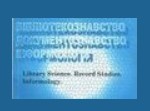ІНТЕГРАЦІЯ ЕЛЕКТРОННИХ РЕСУРСІВ У БІБЛІОТЕЧНОМУ СЕРЕДОВИЩІ ЗАКЛАДУ ВИЩОЇ ОСВІТИ: ПЕРЕВАГИ ТА ВИКЛИКИ
INTEGRATION OF ELECTRONIC RESOURCES IN LIBRARY ENVIRONMENT OF HIGHER EDUCATION INSTITUTIONS: ADVANTAGES AND CHALLENGES
Author(s): Ihor BondarSubject(s): Library operations and management, Electronic information storage and retrieval, Higher Education , Sociology of Education, Distance learning / e-learning
Published by: Національна академія керівних кадрів культури і мистецтв
Keywords: digital resources; library environment; higher education institutions; technology integration; information literacy;
Summary/Abstract: The purpose of this research is to study the integration of electronic resources in the library environment of higher education institutions, to identify the benefits and challenges associated with this process. The study considers the main areas of development of electronic resources, such as access to digital libraries, online catalogues, and databases, providing quality information support for research and teaching activities of students and faculty, as well as improving the digital user service system. The research methodology involves a multi-level approach to analysing the integration of electronic resources in the library environment of higher education institutions. Firstly, a thorough review of the scientific literature is conducted, covering the issues of introducing digital technologies and electronic resources in the educational process and library work. Subsequently, practical examples of successful library modernisation in higher education institutions libraries are analysed in order to identify key success factors, advantages, and challenges on the way to the development of digital tools and services. The research results will help identify trends and prospects for the development of digital libraries. A particularly important element of the methodology is conducting surveys and interviews with professionals in library science, faculty members, and staff of higher education institutions. Engaging various groups of employees will enable a detailed understanding of the needs, attitudes, and beliefs regarding the integration of electronic resources, as well as their impact on the learning and cognition process. The application of these methods in a comprehensive manner will contribute to the creation of a generalised understanding of the problem and the development of effective recommendations for the integration of electronic resources into the library environment of higher education institutions. Scientific novelty. The study focuses on the changes that are taking place in the libraries of higher education institutions as a result of digital transformation and highlights the importance of adapting to new technologies and user needs. Conclusions. The research findings indicate that integrating electronic resources into the library environment of higher education institutions provides a range of benefits, such as increased accessibility and diversity of information resources, improved service, and user convenience. On the other hand, there are challenges that require attention, such as ensuring information security, facilitating library staff adaptation to new technologies, and developing strategies for the successful implementation of digital innovations.
Journal: Бібліотекознавство. Документознавство. Інформологія
- Issue Year: 2023
- Issue No: 2
- Page Range: 102-108
- Page Count: 7
- Language: Ukrainian

